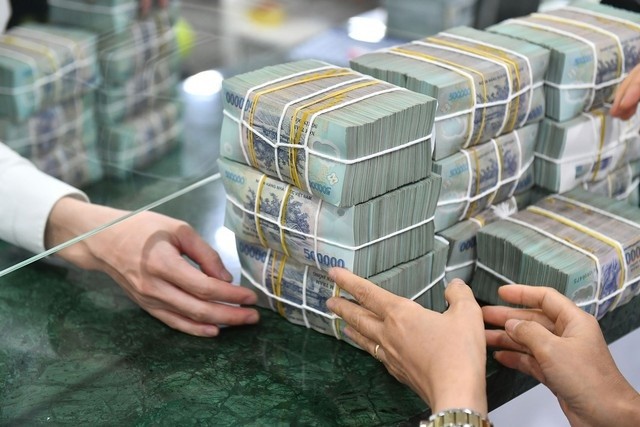According to the SBV, the acceleration of credit growth in the last weeks of June is a normal phenomenon, with credit tending to increase in the second half of a year and decrease in the first months of a year.

Credit by the end of June 2024 increased by about 6 per cent compared to the beginning of the year, reaching nearly VNĐ14.4 quadrillion, a positive signal showing this year's credit growth target of 14-15 per cent is within reach, experts said.
The loans that credit institutions provided to the economy in the first half of 2024 were at the highest level compared to the same period in the past three years, the latest data from the State Bank of Vietnam (SBV) shows.
There was concern that the banking industry would find it difficult to meet the Government’s credit growth target of 5-6 per cent in the first half of 2024, as the credit growth by the end of May this year was only 2.4 per cent. However, credit accelerated in June, especially in the last week of the month (up more than 1.5 per cent), helping the industry meet the target.
Of the total, consumer loans made up more than VNĐ3 quadrillion, accounting for more than 21 per cent of the total.
According to the SBV, the acceleration of credit growth in the last week of June is a normal phenomenon, with credit tending to increase in the second half of a year and decrease in the first months of a year.
Leaders from several banks also explained the acceleration, because in the first half of the year, enterprises often focused on negotiations in the early part of the year, while contracts were mainly signed from mid-year. Therefore, most large credit contracts were also disbursed in the second half.
Experts attributed the high credit growth to recovery in loan demand, promotion in public investment, tax and fee reduction policies and implementation of preferential interest rate lending packages.
Experts forecast loan demand in the second half of this year will continue to accelerate thanks to macro-economic recovery. The manufacturing sector has shown signs of recovery, the industrial production index in the past six months was estimated to increase by 7.54 per cent over the same period in 2023.
Regarding import and export, in the first half of this year, export value reached US$190.73 billion, an increase of 14.9 per cent, while import value reached $178.88 billion, up 17 .3 per cent.
In addition, according to a recent report of credit rating agency FiinRatings, credit growth for the real estate business sector, including investment in real estate corporate bonds by commercial banks, has the potential to recover when legal problems are gradually being resolved. New laws are also expected to create more favourable conditions for the real estate business sector.
Currently, a positive factor for credit growth is that lending interest rates are maintained at a stable level, in spite of a rise of 0.4-1.6 percentage point per year in deposit interest rates in recent months. Commercial banks have so far also affirmed that they will maintain low lending interest rates to stimulate credit demand.
Analysts believe that with the acceleration in loan demand by enterprises in the second half of 2024, the Government's annual credit growth target of 14-15 per cent can be achieved.
MBS Research, a research centre under the MB Securities Joint Stock Company (MBS), forecast that credit growth will hit 14 per cent in 2024, given an expected GDP growth rate of 6.3-6.5 per cent for the year. Drivers for the growth include the recovering consumer finance market, increased credit card usage, robust import-export activities, and high demand for auto loans.
Low lending rates, signs of a reviving real estate market, along with a surge in inventory and land-related tax revenue will also stimulate loan demand in the near future, according to MBS Research.
Echoing the view, the Maybank Vietnam Securities Company (MSVN) held that credit growth since the year's beginning is reasonable and good enough, predicting that credit will accelerate in the third quarter thanks to the real estate market's recovery.
Lê Ngọc Lâm, general director of the Bank for Investment and Development of Vietnam (BIDV), blamed the economy's weak capital absorption on the fact that many businesses were dissolved and businesses’ health declined. However, he expected that credit will grow strongly in year-end months, when businesses get back on track.
Meanwhile, Phạm Chí Quang, director of the SBV's Monetary Policy Department, held that bringing down lending interest rates is a big challenge to the banking system.
To support credit growth, the SBV will continue working to keep interest rates stable and encourage credit institutions to decrease costs and publicise average lending interest rates. It has also issued a circular which allows credit institutions to extend the restructuring of debt repayment deadlines and maintain debt groups for certain sectors until the end of 2024, he added. — VNS





